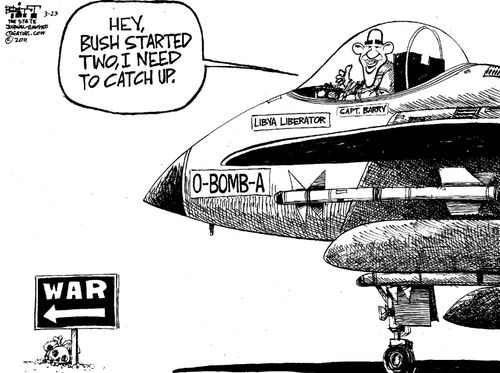by Andrew Young

by Andrew Young
Though recent American presidents have pursued a policy of global hegemony, the Bush administration has pursued world dominance with a vengeance. The administration’s National Security Strategy, for example, calls for preemptive wars against potential threats to American security and commits America to forcefully preventing other countries from attempting to match it militarily. Many Americans are proud of America’s commitment to controlling the rest of the world. On numerous occasions, I have heard people say things like, "Well, someone has to police the world." Others, like the neoconservative William Kristol, argue that America should dominate the rest of the world in a period of "benevolent global hegemony." All ignore the human cost and arrogance of American hegemony.
Believing that America must dominate the rest of the world smacks of arrogance. Though some say that 9/11 gave America the right to declare itself world hegemon, nothing has given us that right. In fact, America’s hegemonic policies, such as supporting dictators like Saddam Hussein, contributed to the hatred that produced 9/11. Rather than arrogantly pursuing hegemony, America should work to roll back its global presence that incites hatred; it would be prudent to start by pulling troops out of the 120 countries where America maintains a military presence. However, it should come as no surprise that George W. Bush believes America must respond to 9/11 by "benevolently" controlling others; he thinks of his own countrymen as 10-year-old children that must be guided.
Some refuse to accept American dominance and resist it violently. The Bush administration learned this lesson the hard way in Iraq. They expected the Iraqis to greet them with flowers, not guns. Now thousands of young men have been forced to kill Iraqis who resist American domination, and thousands of civilians have been killed as well. How "benevolent" is American hegemony for those who have been killed and the soldiers who are forced to kill or be killed to enforce it?
The phrase "benevolent hegemony" is an oxymoron. Military hegemony can never be benevolent. Merriam Webster’s Collegiate Dictionary defines hegemony as "preponderant influence or authority over others." Iraqis speak four languages, and many different ethnic groups reside there; they differ drastically from each other, even more so from Americans. Therefore, America will never peacefully exercise "preponderant influence or authority" over such a complex country, especially after the uproar caused by prison abuse at Abu Ghraib, and authority maintained through violence is not positive. Even if the Iraqis could be peacefully coerced into accepting American hegemony, it would still not be benevolent. Imposing a foreign system on another nation is hubristic, not benevolent.
Some argue that this war is about spreading freedom, not American hegemony. If that is the case, why does the administration plan to maintain military bases in Iraq for decades to come? Jay Garner, who helped lead Iraq’s reconstruction in 2003, said in an interview that Iraq is "our coaling station that gives us great presence in the Middle East."
Most of those who defend America’s pursuit of hegemony, like George W. Bush, Paul Wolfowitz, and Dick Cheney, have never fought in war. They have never killed anyone to enforce the doctrines they espouse. Nor have they sent their children to do it. Would they? If not, they are hypocrites. If they would, they could only be megalomaniacs to sacrifice so much to accumulate power.
No comments:
Post a Comment